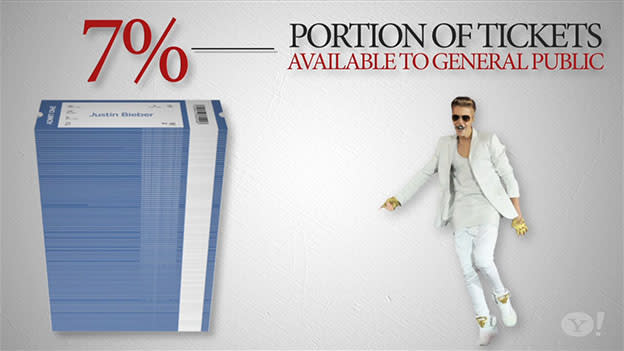The Little Secret Of The Concert Business

Some of the biggest acts in music are hitting the road this summer: Beyonce, The Rolling Stones, Jay-Z and Justin Timberlake, just to name a few.
But have you tried to get tickets to see your favorite megastar?
You can call or go online the moment tickets go on sale, but they can be sold out in seconds.
Why is it so hard to get tickets to the hottest concerts?
That's the subject of today's Just Explain It.
You might think these concerts sell out so fast because of the high demand for tickets. But the profitable little secret of the concert business is just how small the supply of tickets actually is. In some cases, as little as seven percent of all tickets for an event go on sale to the general public.
[Related: Pricey Tickets for Rolling Stones Tour Test Limits of Live-Concert Market]
That was the portion of tickets up for grabs to the general public for a Justin Bieber show earlier this year. An investigation by Nashville’s NewsChannel5 found that out of close to 14,000 tickets at the city’s Bridgestone Arena, just over a thousand were available for the public onsale. Public onsale is the time tickets go on sale to the general public.
Why were there so few tickets available? Two words: Pre-sales.
Almost 5,800 of those Bieber tickets were made available to American Express customers. And another 2,900 went to people who paid to be in his fan club. Additional tickets are reserved for the artist, the tour, music industry people, promotions, and others, which left very few tickets for the public onsale.
Bieber is far from the only artist to sell so few tickets to the broader public. Pre-sales can make up the bulk of ticket sales for many concerts. In addition to pre-selling through credit cards and fan clubs, venues and ticket-sellers like TicketMaster also have pre-sales.
So, why are there so many pre-sales? It’s a business decision. Credit card, fan club and venue lists are valuable consumer data. It’s better to target potential ticket buyers who have the money and interest in a performer to guarantee the arena dates sell out.
That’s important for one major reason: Money. With declining record sales, concert tours are one of the few remaining places where artists can make a lot of cash. For example, Billboard magazine named Madonna music’s top-Moneymaker last year with earnings of more than $34 million dollars. More than 93-percent of that, an estimated $32 million, was made from her tour. Madonna’s tour was also the top-grossing of the year. By comparison, the physical and digital album sales portion of her earnings was estimated at just $1.5 million.
And whether or not you get in on one of those pre-sales, you still have to compete with scalpers. Using multiple credit cards and computer programs to bombard ticket sellers with thousands of requests, scalpers buy up large quantities of tickets to resell for a profit.
[Related: Kid Rock, Rolling Stones on Scalping, Summer Tours]
If this seems unfair to you, you’re not alone. Lawmakers in New York and New Jersey have put forth bills that would encourage more transparency about how many seats are actually available during public onsales.
What do you think? Have you had trouble getting concert tickets? What have you done to see your favorite artists? Give us your feedback in the comments section below, or on Twitter using #JustExplainItNews.
